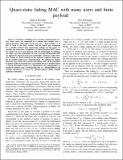Quasi-static fading MAC with many users and finite payload
Author(s)
Kowshik, Suhas S; Polyanskiy, Yury
DownloadAccepted version (351.3Kb)
Open Access Policy
Open Access Policy
Creative Commons Attribution-Noncommercial-Share Alike
Terms of use
Metadata
Show full item recordAbstract
© 2019 IEEE. Consider a (multiple-access) wireless communication system where users are connected to a unique base station over a shared-spectrum radio links. Each user has a fixed number k of bits to send to the base station, and his signal gets attenuated by a random channel gain (quasi-static fading). In this paper we consider the many-user asymptotics of Chen-Chen-Guo'2017, where the number of users grows linearly with the blocklength. In addition, we adopt a per-user probability of error criterion of Polyanskiy'2017 (as opposed to classical joint-error probability criterion). Under these two settings we derive bounds on the optimal required energy-per-bit for reliable multi-access communication. We confirm the curious behaviour (previously observed for non-fading MAC) of the possibility of perfect multi-user interference cancellation for user densities below a critical threshold. Further we demonstrate the suboptimality of standard solutions such as orthogonalization (i.e., TDMA/FDMA) and treating interference as noise (i.e. pseudo-random CDMA without multi-user detection).
Date issued
2019-09Department
Massachusetts Institute of Technology. Department of Electrical Engineering and Computer ScienceJournal
IEEE International Symposium on Information Theory - Proceedings
Publisher
Institute of Electrical and Electronics Engineers (IEEE)
Citation
Kowshik, Suhas S and Polyanskiy, Yury. 2019. "Quasi-static fading MAC with many users and finite payload." IEEE International Symposium on Information Theory - Proceedings, 2019-July.
Version: Author's final manuscript